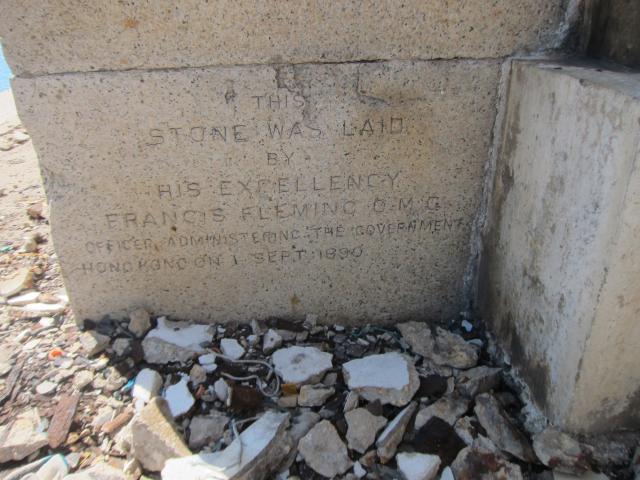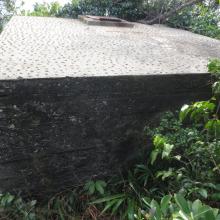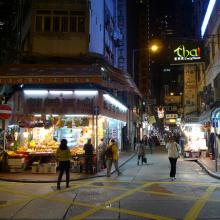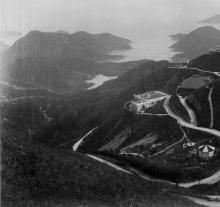Gap Rock lighthouse foundation stone
Primary tabs

Submitted by SW Poon
Date picture taken (may be approximate):
Wednesday, April 15, 2015
Gallery:
Connections:
- Gap Rock lighthouse foundation stone shows Place Gap Rock Lighthouse [1892- ]




Comments
Laying the Foundation Stone
The event was described in the next day's Hong Kong Daily Press on page 2:
THE GAP ROCK LIGHTHOUSE
LAYING OF THE FOUNDATION STONE.
The foundation stone of the Gap Rock Lighthouse was laid yesterday afternoon by His Excellency the Acting Governor. The well known rock on which the lighthouse is to be erected is a small sterile island,about 400 foot in length, 34 miles to the south west of Hongkong. The main building will be in three storeys, or to be more correct, a basement and two storeys. On the basement is a large tank, capable of holding 12,000 gallons of water, The necessity of this is at once apparent, as owing to the difficulty of reaching the rock at all times and the impossibility in bad weather of reaching it at all, frequently for long periods one of the first things that it was necessary to secure was a large supply of water for the use of those living there. By means of pipes the water to fill the tank will be collected from the roof of the building, which is of asphalte, and further, the supply from the tank will probably be supplemented by a condenser. The floor above will contain two living rooms for the lightkeeper, a workshop, and a kitchen. On the next floor will be two more living rooms and coolie quarters. The building will be in two blcoks, connected by a stairway, this method of construction being necessitated by the conformation of the rock, the building being as far as possible adapted to the outline. On the top of the main building will be the lantern, the centre being 140 feet above the mean sea level, this being a few feet higher than was originally intended when the plans were first drawn. Under ordinary conditions the light will be visible at a distance of 21 nautical miles and under very favourable conditions some distance further.
The preliminary operations in connection with the erection of the building have been difficult in the extreme, a thousand tons of the hard metamorphic rock having to be blasted before work could be commenced. The building will be of a substantial character, consisting of granite facing set in Portland cement, the walls will be of extra thickness, and as the floors are to be of iron and concrete, the building will be practically fire proof. The light is to be a flash revolving light of the first order, giving a flash every thirty seconds and completing one revolution in four minutes. The light will be of about the same dimensions as that at Cape D’Aguilar, but its force will be nearly double that one. The light and the lantern have already arrived and are. now in store in Hongkong. The lantern is 25 feet in height and 12 foot 10 inches in diameter. The makers are the well known manufacturers of this class of work, Messrs. Chance Bros. of Birmingham.
It is estimated that the whole work will be completed and everything in working order, should no unforeseen accident occur, by the end of 1891, but of course should a protracted spell of bad weather prevent the work proceeding, this time may have to be a little extended. Two-thirds of the material required for the construction of the building have already been landed on the rockr. Up to the present the work on the rock has been of a preparatory nature, consisting chiefly of blasting, making roads, and erecting quarters for the workmen. Work commenced in earnest for the first time on the 24th March with thirty or forty men and has gone on continuously ever since, the number of men now employed being about one hundred. One fortunate circumstance that has told in favour of the progress of the work is that up to the present there have been no cases of sickness among the workmen.
The revised estimate for the entire cost of construction is $150,000 and it is hoped and believed that the building when completed will not appreciably overrun this estimate. In this matter, however, as in the estimate of time, much depends on the weather that may prevail during the period of erection.
In addition to the light it is under contemplation to fix a foghorn for use in thick weather, when even this powerful light may not be visible. The wisdom of such a course is undoubted.
The masonry work has been let on contract to Mr. Tsang Keng, whose name is well known in connection with contracts in respect of large public works, and the construction is being superintended by Mr. Mudie, of the Public Works Department, under the supervision generally of which Department the whole work is being carried out. Considering the great initial difficulties that had to be overcome before even a commencement oould be made with this undertaking, the untiring perseverance that has been shown and the progress that has been mode reflects credit on all concerned, and should the work of construction continue to be conducted, as there is no reason to doubt but it will, with the same energy and skill, the chief of the Department, Hon. S. Brown—from whose plans and according to whose ideas the work is being carried out—will have in the lighthouse a substantial testimony to the ability displayed during his period of service here of which he should have every reason to be proud.
A small party of gentlemen, chiefly from official circles, accompanied His Excellency yesterday to witness the ceremony of laying the foundation stone. Among those present were H. E. Major-General Digby Barker and his A.D.C. Lieut. Barker, Commodore Church, the Acting Chief Justice, Mr. Fielding Clarke; the Acting Attorney-General, Hon. E. J. Ackroyd; the Surveyor-General, Hon. S. Brown; Capt. Rumsey, R.N., Harbour Master; Major-General Gordon, Acting Captain-Superintendent of Police; Major Dempster, Acting Superintendent of the Gaol; Mr McLeavy Brown, Commissioner of Customs for Kowloon; Capt. Booth, of the Chinese Customs Service; Mr. F. H. May, Private Secretary to the Governor; Lieut, Thorburn, A.D.C. to the Governor; several members of the Public Works Department, &c.
The party left the Murray Pier shortly after 9a.m. in the steamer Fame, which is employed by the Government in connection with the building of the lighthouse, and after a pleasant run arrived off Gap Rock about one p.m. Owing to the heavy sea that was running it was found to be impossible to effect a landing at the usual side of the rock, where a road has been cut to its summit. The party were therefore landed in small sections, first by means of one of the steamer's boats which took them to small cove, and from there they were hoisted in couples by means of a derrick on to a landing place about half way up the Rock. This method of landing occupied considerable time and afforded much amusement to all concerned. It was one of those instances where a man failed to he a hero, not only to his own valet, but even to the boatmen and coolies, and officialdom for once appeared helplessly human. A Chief Justice, a General,a Governor even, could scarcely, with the best intentions, preserve a dignified appearance while being hauled up by a crane like a bale of goods and remaining occasionally for a few seconds suspended between earth and heaven like Mahomet's coffin. The landing being at last effected, the party proceeded to the summit of the Rock, where the ceremony of laying the foundation stone was to be performed.
Before proceeding to lay the stone, His EXCELLENCY said—It affords me great pleasure and satisfaction to take part in the ceremony to perform which we are here today. The laying of this foundation stone will, I feel sure, prove a great source of safety to that large amount of shipping which during the course of the year travels over distant seas, bound for this eastern part of the world. We know that when this project was first thought of several difficulties arose in connection with it, but it was so generally admitted that a lighthouse to the south of Hongkong would be desirable that these difficulties were at last overcome, and to-day we give the real commencement to a work which we all trust will be a boon to many. We know that Governor Des Voeux used every exertion in order to bring this work to completion, bat his good services would have availed but little had he not obtained the co-operation of the Chinese Authorities. Therefore those who will derive a benefit hereafter from this lighthouse will not only owe a debt of gratitude to Hongkong but also to the Chinese Authorities who co-operated with them to carry out the scheme, as also to Sir. Robert Hart, the chief of the Imperial Chinese Maritime Customs and, I believe to Her Majesty's Minister at Peking, who did all he could to further Sir William des Voeux’s wishes, in order that this work should be commenced. There is no doubt that this work will be a somewhat costly one. The revised estimate is I believe, $150,000 and I earnestly hope, and I believe that such will be the case, that this estimate will not be exceeded. Of course, a great deal depends on the condition of the weather. If the weather is favourable the work will progress more quickly and the expenses will be less; if the weather happens to be bad the work will be delayed and the cost will be more. However whether the cost should be within the estimate or whether it should be above it, you will I think all agree with me, that it is money well spent.. This lighthouse when completed will be about 140 feet high and the light will be visible from a distance of 21 miles. The more navigation increases, as it does every year, the larger ships are made, the more valuable the cargoes that are carried round the world, the greater the number of passengers carried, the greater should be the securities for safety, and amongst these, none are greater than those beacons which are erected in all parts of the world for the guidance of vessels through the boisterous and obscure waters found in every sea all the globe over. It is I repeat a very great pleasure to me to lay this foundation stone to-day and I hope that before the end of next year or early in the commencement of the year following, this great work so long thought of will be brought to a satjsfactory conclusion.
The stone having been lowered into its place was declared by His Exoellency to be well and truly laid, three cheers being given by those assembled, the Chinese workmen following with much firing of crackers and bombs. After having made an inspection of the work already done in preparation for the construction, the party were again put on board.
The steamer cast off from her buoy about 3 p.m. An excellent tiffin was served en route Hongkong and the steamer arrived off Murray Pier, shortly after 6p.m. a most pleasant trip having been made by all on board.
Gap Rock - Lighthouse Keepers
Francis (Frank) Coleman I believe was the Assistant Lighthouse Keeper at Gap Rock in 1898, and retired as Master of Lights. He was also responsible for Green Island Explosive Depot.
I would be interested to learn more about Frank Coleman, and his career in Hong Kong.
Thank you - anyone.
I've made a page for F A Coleman
I've made a page for F A Coleman at http://gwulo.com/node/33051#comment-36776
Regards, David